When stress becomes constant, the body’s stress response, its built-in alarm system, stays switched on. Dr. Luis Buenaver, a sleep expert at Johns Hopkins, explains that this constant activation prevents the body from returning to its natural baseline, leaving you in a prolonged “fight-or-flight” state. In this condition, stress hormones such as cortisol and adrenaline remain elevated, causing your heart rate and breathing to speed up and making it difficult to relax at bedtime. It’s like running a car engine in high gear all day and night, eventually, exhaustion sets in.
According to the Cleveland Clinic, anxiety and sleep problems often go hand in hand. People who feel worried before bed may find it hard to fall asleep or stay asleep, while those who already struggle with insomnia may begin to fear bedtime itself, anticipating another restless night. This vicious cycle can result in nocturnal panic attacks, nightmares, and difficulty concentrating during the day. Over time, persistent sleep anxiety may contribute to long-term issues such as high blood pressure, heart disease, and even impaired immune function.
Fortunately, there are proven ways to break this cycle. Johns Hopkins experts recommend engaging in activities that activate the body’s relaxation response. Unlike passive distractions, such as watching TV, intentional relaxation techniques help lower stress hormones and promote deeper, more restorative sleep. Practices like yoga, meditation, or tai chi can be especially beneficial, but even simple breathing exercises can make a difference. Try setting aside 20 minutes before bed to sit quietly, breathe deeply into your belly, and consciously release tension from your muscles. Progressive muscle relaxation, where you tense and relax muscle groups from your head to your toes, can also help reduce physical stress and prepare your body for rest.
In addition to relaxation techniques, adopting healthy sleep hygiene can improve sleep quality. Go to bed and wake up at consistent times each day to regulate your circadian rhythm. Keep your bedroom dark, cool, and quiet, and reserve your bed for sleep and intimacy only. Avoid caffeine and alcohol in the evening, and limit screen time before bed, since the blue light from phones and tablets can interfere with your body’s natural melatonin production. If you can’t fall asleep within 20 minutes, get out of bed, do something calming like reading or stretching, and return only when you feel sleepy again. These habits help retrain your brain to associate the bed with rest, not worry.
For some individuals, professional guidance may be necessary. Cognitive Behavioral Therapy for Insomnia (CBT-I) is considered one of the most effective treatments for chronic sleep anxiety. This structured program helps people change unhelpful thoughts and behaviors related to sleep, creating long-term improvements without relying on medication. In certain cases, short-term medication may be prescribed by a healthcare provider to help manage underlying anxiety or sleep disorders.
Ultimately, improving sleep isn’t just about getting more hours, it’s about reducing stress, supporting recovery, and restoring balance to both the mind and body. When your nervous system learns to relax, your muscles, joints, and overall health benefit as well. A calm mind promotes a well-rested body, and better sleep enhances everything from focus and mood to physical healing and pain resilience.
Disclaimer:
This article is intended for educational purposes only and should not replace professional medical advice, diagnosis, or treatment. If you are experiencing chronic insomnia, anxiety, or difficulty managing stress, consult your healthcare provider or a qualified sleep specialist.
References:
– Johns Hopkins Medicine. (2025). Sleepless Nights? Try Stress Relief Techniques.
– Cleveland Clinic. (2024). Sleep Anxiety: Symptoms, Causes, and Treatments.
– Harvard Health Publishing. (2024). Sleep Hygiene: Simple Practices for Better Rest.
